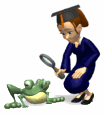ETHOLOGY TIPS BY NEOMI
Like Niko Tinbergen & Konrad Lorenz, have you been fascinated with animals fom the time you were a youngster? Our friends frequently compare notes on what they have observed in the animals around them on a daily basis, as well as from videos like Animal Planet and YouTube. However, we often talk more from a Folk Psychology than a scientific perspective. Use the [BLOGS] link at the right to dialogue more with peers who share our interest in scientists' perspectives on this course.
Alot of the examples in the readings may already be familiar to you, and Dr. P will be challenging you to "play detective" and search for the science behind the myths. Whether you have already conducted your own inquiry projects or are a "scientist wanabe", this course is designed to help you practice research skills.
For those of you who are planning a career in science, this course will also help reinforce the basic questions that apply throughout the biological sciences. Tinbergen referred to these questions in terms of causal mechanisms, ontogeny, function and evolutionary history. You may have learned the same ideas, just different words for them. For a refresher on the concept map basic to biology, this tutorial will be a good guide for you to wade through the jargon if it is new to you.





